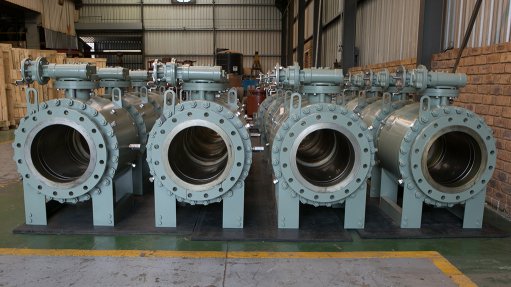
MAPPING THE WAY FORWARD RGR Technologies looks forward to slowly introducing three-dimensional printing into its processes to assist with the manufacture of valve parts
A prevailing issue facing the valves sector is the “poor attitude” to local procurement in the public and private sectors, says valves manufacturer RGR Technologies commercial director Ross Hunter.
“Up until 2018 there was very little change in the importation of valves. The valve industry was not growing, and I believe this should be an industry that employs at least double what we are employing at the moment,” he adds.
He also notes that at least R1-billion of what is imported could be made locally; although many valve manufacturers in South Africa have lost tenders to importers where price has been the main issue.
This issue has been worsened by the Covid-19 pandemic, which has forced South Africa into a national lockdown, consequently impacting on the operations of many businesses, including RGR.
Moreover, Hunter tells Engineering News that, with the mining industry having been put under care and maintenance during lockdown, this has affected the company negatively, with sales having almost completely dried up.
“The oil and gas, and chemicals industries have also drastically cut back on procurement, owing to low demand. Hopefully, the economic packages that government has introduced and the limited restarting of operations in some key sectors will relieve us in some way,” he highlights.
As such, the company will cut back on manufacturing and/or machining and subcontracting going forward as a means for survival. This, says Hunter, can assist the company in cutting back on costs by not having to work overtime while machines are idle.
He mentions that, to date, a number of State-owned entities (SOEs) have placed their projects on hold – especially in the water, and oil and gas sectors – which has had a negative impact on local manufacturers such as RGR.
He notes that local manufacturers are having to deal with reduced sales, with some already in a distressed state.
“There have been retrenchments, as well as implementation of shortened working hours in the past year. The remaining challenge is whether there will be enough funds for SOEs to reopen these projects, especially new infrastructure development,” adds Hunter.
Products for Industry
RGR supplies a range of ball and check valves for numerous sectors.
For instance, its Reliaball has been used by deep-level mines for more than 25 years and has a good record in harsh, high-pressure isolation applications.
“These valves have a unique design, compared with that of a standard ball valve. RGR is also the only API 6D manufacturer in South Africa for ball and check valves to the petrochemicals and oil and gas industries,” he notes.
Moreover, as automation, mechanisation and other such optimisation strategies are currently a huge talking point in many industries, the company deploys several smart valve technologies in this regard.
This includes RGR’s three-dimensional (3D) design software that enables the company to design and develop new products quicker.
“Although automating the manufacturing of parts of valves is a challenge, we look forward to slowly introducing 3D printing into our processes to assist with the manufacture of valve parts,” he comments.
Hunter concludes that the company is also working on upgrading its enterprise resource planning system to become more digitalised.